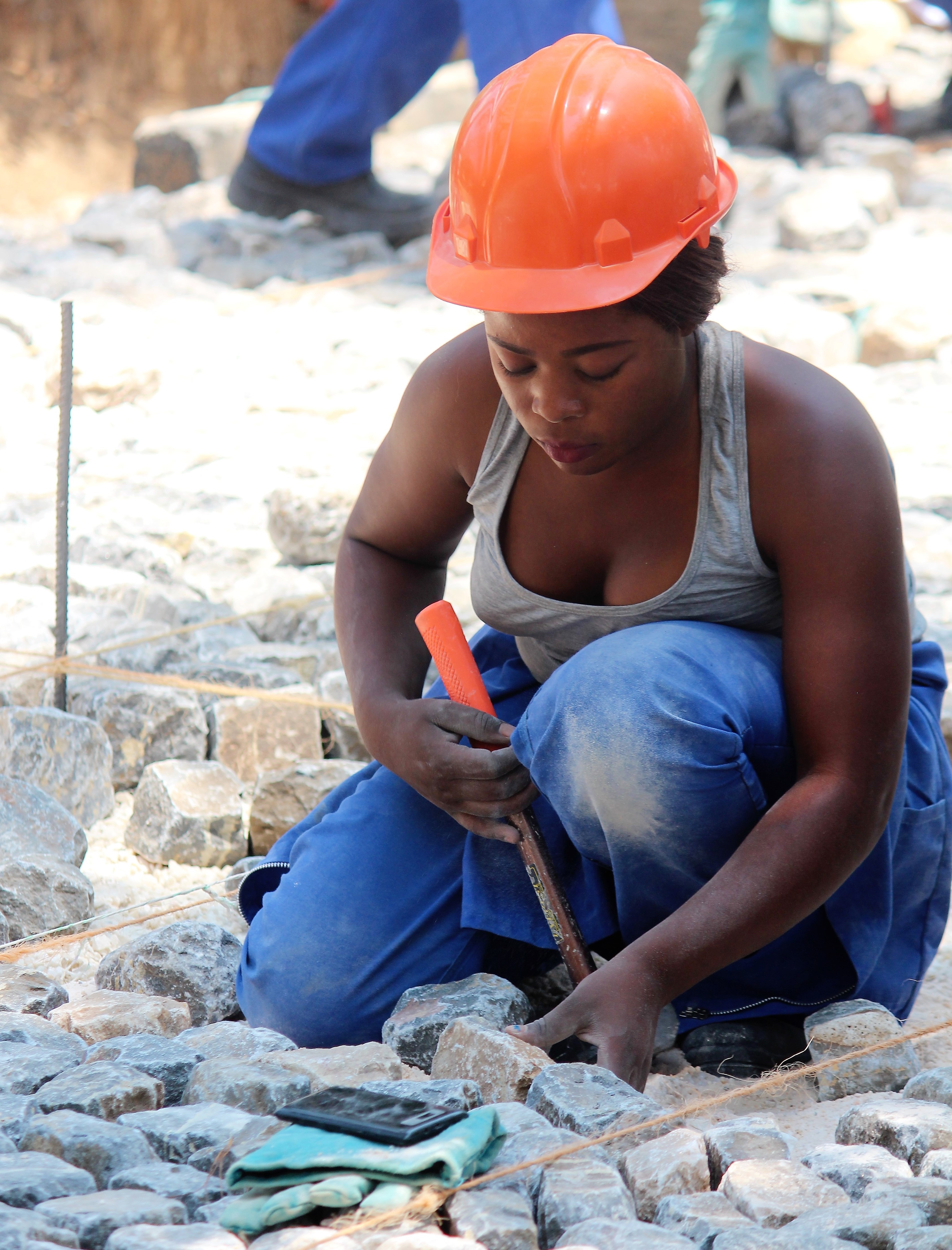--- Image caption ---
After a 28-day intensive training course in cobblestone paving, which was part of the broader programme to empower youths with relevant aspects of cobblestone cutting, chiseling and laying techniques as a means of employment, Georgina Chama, 45 years old, is now the founder and chairperson of Cobblestone Multipurpose Cooperative Society in Lusaka province.
Owing to the training that Georgina received in 2018 with support from UNDP and National Council for Construction (NCC), the cooperative, which was her initiative as part of her Return to Work proposal, was set up with a total number of 30 members. Her Return to Work plan, which was submitted to TEVETA draw enough attention and interest. Subsequently, she trained 15 males and 15 females who are now available for employment with technical skills in in road paving using cobblestone techniques.
“I was identified by the Association of Women in mining in Zambia to participate in the initial training in cobblestone paving. This was due to my passion in the area of small-scale mining particularly as it relates to not-so-expensive minerals such as cobblestones. I applied for the advertised course and participated for 28 days. I was amongst the 57 women and youths that were trained. The Return to Work component is what triggered my interest in writing a proposal to TEVETA, which they accepted and trained my 30 identified members”.
Like many young Zambians, Georgina’s employees are amongst the many people who are unemployed. They are young and they are female. Young people in Zambia represent at least 36 percent of the country’s 17.6 million people and yet they continue to be under-represented in socio-economic activities with unemployment rate at its highest at 7.79.
In 2018, the UNDP’s programme on inclusive growth and poverty reduction organized a programme that would contribute towards empowering youths through employment. In partnership with the Ministry of Mines and Minerals Development (MMMD) and supported by the Africa Caribbean Pacific-European Union Development Minerals Programme, the project provided capacity building opportunity to over 50 youths and women. The training supports the active use of cobblestone, whilst others are in value-addition and sale of Development Minerals in local markets. Many others earn a livelihood by supplying goods and services to Development Minerals operations.
Lyapa Manza, the UNDP Project Manager had this to say:
“The aim of the project was to build capacity amongst the youths and women with a focus on empowering them in all relevant aspects of cobblestone cutting, chiseling and laying techniques as a means for employment. The capacity building activities under the development minerals programme is to increase the sector's productivity; better manage mining operations; adhere to national and international environmental and health standards; and prevent conflict through effective community relations. Specifically, the training for 2018 was focused on providing a programme that brought together individuals from all over the country and interested in the value addition of cobblestones”.
Artisanal and small-scale mining (ASM) has become one of the most important means of Development Minerals in Africa, and Zambia has discovered that it can contribute to unlocking women’s and youth employment opportunities.
This programme has brought renewed hope among young people and women in Zambia, as it is being promoted at a time when the Government through the Road Development Agency is promoting the use of development minerals (cobblestone) in road paving through the Pave Zambia 2000 Project.
The cooperative, according to Georgina, expects to begin tendering for works with Pave Zambia 2000. She hopes that the cooperative will be an opportunity for self-employment and empowerment to the many youths in the cooperative.
The programme as a UNDP initiative is earmarked to benefit over 4,300 youth and women, who will be participating through the “return to work” initiatives that involve setting up cooperatives and small-scale companies to create work opportunities and lift people out of poverty. The aim of the return to work component is to support graduates with practical components once in the field.
This project is funded by the ACP-EU Development Minerals Programme and is a three year, €13.1 million capacity building programme that aims to build the profile, and improve the management, of Development Minerals. The programme is an initiative of the African, Caribbean and Pacific (ACP) Group of States, financed by the European Union and the United Nations Development Programme (UNDP) and implemented by UNDP and Ministry of Mines and Minerals Development.
The ACP-EU Development Minerals Programme is implemented at both the regional and country levels. At the regional level, the programme conducts capacity building activities with participants from forty ACP countries through regional training workshops, field trips, the production of guidance products and knowledge exchange. The programme will also host a final conference to enhance the knowledge sharing activities con-ducted during the programme. Participants of regional training workshops implement the skills and knowledge that they have gained from the training through return to work plans. At the country level, in depth capacity building is under-taken with six focus countries: Cameroon (Central Africa); Guinea - Conakry (West Africa); Uganda (East Africa); Zambia. (Southern Africa);Jamaica (Caribbean);and Fiji (Pacific).
Cobblestone mining and paving in other parts of the world is a commonplace since ancient times.

 Locations
Locations





